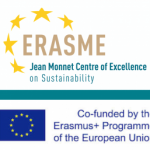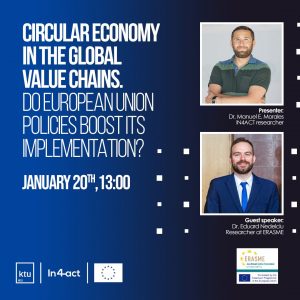ABOUT THE PRESENTATION
The webinar addresses the role of normative differences according to the production processes and materials origins in the circularity of global supply chains.
Eight priority areas in the industry have been identified where the circular economy is currently gaining momentum in the macro level implication within the political agendas: (1) Manufacturing industries, (2) Biomass & bio-based products, (3) Energy, (4) Food, (5) Construction and demolition, (6) Critical raw materials, (7)Water, (8) Chemical industries.
The analysis of the CE strategy, reports that meso analysis is predominant in the studies on Manufacturing, Construction, Demolition and Water, while the macro approach predominates in the areas of Biomass, bio-products, food and energy. Circular economy policy in the European Union CE concept is advancing from material-based to society-based; and to accomplish this transition society needs to invest on transparency, you can only improve what you can measure, and Digital transformation to put in trails the implementation of smart coding systems, data analytics in multi-dimensional strategic evaluation and blockchain technologies among others.
European Union Green Deal is a major driver for circular economy in the coming decade but its success depends on transformative, systemic action for socio-ecological well-being.


 Dr. Manuel E. Morales is Researcher at ERA Chair team, IN4ACT at the School of Economics and Business, Kaunas University of Technology and member of the Executive board at the ERASME Excellent Centre for Sustainability in France. He holds a Ph.D. in economics from the Université Clermont Auvergne and a Postdoc at the Industrial Bioeconomy Chair in NEOMA Business School. Holding a graduate degree (Master) in Sustainability education (FR) and other in Agribusiness studies (MX).
Dr. Manuel E. Morales is Researcher at ERA Chair team, IN4ACT at the School of Economics and Business, Kaunas University of Technology and member of the Executive board at the ERASME Excellent Centre for Sustainability in France. He holds a Ph.D. in economics from the Université Clermont Auvergne and a Postdoc at the Industrial Bioeconomy Chair in NEOMA Business School. Holding a graduate degree (Master) in Sustainability education (FR) and other in Agribusiness studies (MX). Dr. Eduard Nedelciu is Researcher at
Dr. Eduard Nedelciu is Researcher at 

